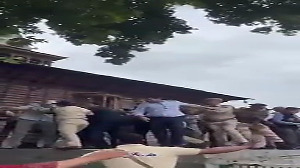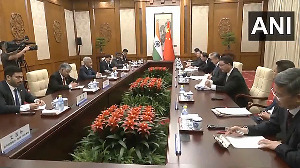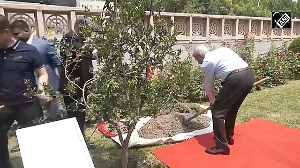Indicorps Fellow Vevake Prasad shares his experience of working in India on the Indicorps public service fellowship.
These days, it seems, more than a few of us are worked up over 'change'.
As the national debate continues to swing back and forth on every possible angle regarding change, we are relearning a lesson we probably already knew -- change is slow, and at best, difficult. Over the last few years, I too, have become infatuated with the idea of change. In search of change, I found my way to rural Rajasthan, India, this past August for a year-long fellowship in service and development. I came with hopes of making an impact on rural unemployment, and in the process, making some inner changes as well. I've worked on both fronts at a furious pace with passion and dedication. The results, though, are yet to come in, and are likely to remain elusive during the duration of my fellowship.
If results manifest themselves, it'll probably be long after I've left. It's an incredibly exciting proposition on one hand, and an incredibly frustrating one on the other. For those of us in pursuit of change, it seems like we're doomed to a lifetime of frustration, unless we can find a way to deal with it.
So how do we sweat it out? How do we cope with the pace of change? It turns out that we don't have to. There is an alternative to coping with the pace of change, a surefire way to foster almost instantaneous change. It's not too good to be true, but it will require you to put away any skepticism and embrace it with an open mind.
In August of this year, before embarking for our project sites, me and the 26 other Indicorps Fellows met an incredible man named Jayeshbhai, the leader of a Gandhian NGO called Manav Sadhna in Ahmedabad, India. During his talk, Jayeshbhai challenged us to follow the principle of always coming from a place of genuine love when interacting with others. It's easy to be skeptical or dismissive of cheesy maxims like this, but Jayeshbhai's absolute practice of the ideal makes you realise its power.
When he speaks to you, you become absolutely paralysed by the pure, unadulterated love in the air. You can't stop grinning from ear to ear. Inspired by Jayeshbhai, I decided to try and implement the principle in my daily life. Over time, however, I found myself failing miserably, with less-than-loving thoughts often getting the better of me. I became skeptical, thinking that "coming from a place of love" was a nice way to treat people, but impractical as a strategy in bringing about meaningful change.
A few weeks ago, I was in Ahmedabad again. While there, I participated in an activity in which we were to go out into the city and convince sellers at roadside stalls to quit using plastic bags. I didn't think that the men manning those stalls -- who are at times treated rudely, robbed, work hard but barely make enough money to scrape by -- would react warmly to a random outsider asking them to change how they run their business. It seemed like the perfect chance to test the idea and to redeem myself -- to give a really genuine try at having my head, heart, and hand (as Jayeshbhai says) aligned in the spirit of love, and to see what happens.
As I walked out onto Ashram Road, I tried to imagine the lives of the men I was about to approach. I tried to come from a place of understanding, remembering that if they responded guardedly, skeptically or negatively, there would be perfectly good reasons behind it. And so I went for it. I approached each man one by one, with humility, as if he was my older brother. I walked to each stall with a friendly smile, greeting the men respectfully, introducing myself and asking for their name. I insisted on standing if they asked me to sit, and I sat on the street below them if they were sitting. Most were stunned. One asked me, "Are you some kind of Gandhi?" I laughed at the ridiculousness of the question, and asked him if he knew the problems associated with plastic bags, explaining why I was there.
I asked the men if they would accept my pyaar bhari tofa (love filled gift) of a few bags I had made out of newspaper, and hand them out to customers instead of plastic bags. I told them it would mean the world to me, and I meant it. Every single person I spoke to pledged to no longer hand out plastic bags unless a customer demanded one, and agreed to use the newspaper. A few of the men even invited me to their homes for dinner.
More than anything that day, I feel as though I made friends. Two hours later, a colleague of mine was walking down the same street, and overheard some of the men I had spoken to calmly explaining to customers why they wouldn't hand out plastic bags anymore.
This was change.
If you're fed up with the pace of change -- here's your chance to challenge it. It's not easy, but all you have to do is wholeheartedly come from a place of love in your interactions with others. You might be skeptical today, but if you try it tomorrow, you might just become a change-maker forever.
Born and raised in New Jersey, Vevake recently graduated from Carnegie Mellon University with a double major in Policy & Management and Political Science. He is now fulfilling long-held dreams to spend time in India doing service and development related work and becoming a cricketer.








